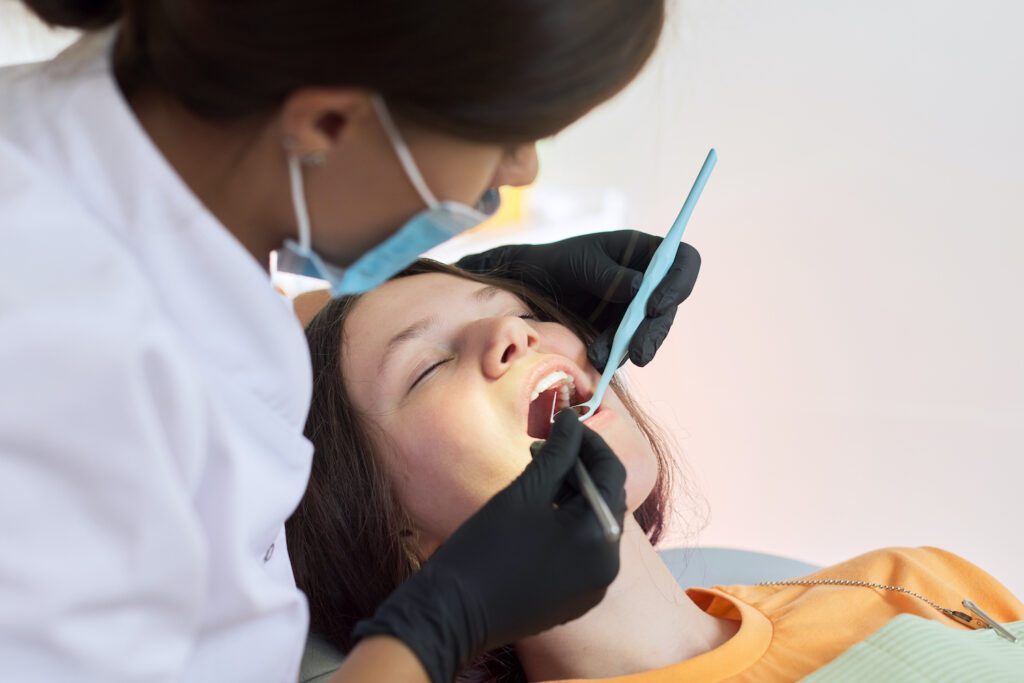Gum disease, often called periodontal disease, is a common oral problem despite being easy to prevent. There are several stages of is, each with distinct symptoms. Knowing how the disease and how it works can help you prevent it.
At each routine dental checkup, we will thoroughly examine your mouth for signs of periodontal disease. If you have it, East Quarter Dental can help you manage it with several gum disease treatments in Dallas, TX.

What Causes Periodontal Disease?
The primary cause of gum disease is bad oral hygiene habits. Failing to care for your oral health properly allows plaque to invade your teeth and gum line. However, there are some other factors that can contribute to the development of this disease, including:
- Hormonal changes (during puberty, pregnancy, or menopause)
- Certain medications
- Nutritional deficiencies
- Smoking or tobacco use
- Chronic stress
The Stages of Gum Disease
Gingivitis is the first stage of periodontal disease. It will lead to gums that are red, swollen, and bleed easily. If you do not seek treatment for gingivitis, it can progress to periodontitis. This stage of gum disease is a more severe form. Periodontitis can harm the soft tissue and bone that support your teeth. In most cases, this lead to tooth loss.
You should understand the difference between gingivitis and periodontitis. Gingivitis is reversible with proper care and fast treatment. Periodontitis, on the other hand, requires more intensive treatment and can have long-lasting effects on your oral health.
Signs and Symptoms of Gingivitis
- Red, swollen gums
- Bleeding gums, especially when brushing or flossing
- Bad breath
- Receding gums
- Tender gums
- Sensitivity to hot or cold temperatures
Symptoms and Complications of Periodontitis
The symptoms of periodontitis will vary for each patient. It will also depend on how advanced the disease is. In the early stages, you may experience:
- Persistent bad breath
- Painful swollen, red, or tender gums
- More bleeding gums during brushing or flossing
- Gum recession
- Loose teeth
As your gum disease gets worse, more severe symptoms may arise, including:
- Deep pockets between the teeth and gums
- Pus or abscess formation
- Bone loss
- Tooth loss
- Difficulty chewing or speaking
Advanced periodontitis: The final stage
Advanced periodontitis is the worst stage of gum disease. At this stage, the destruction of the supporting bone and connective tissues is broad. You will likely have significant tooth mobility and potential tooth loss. The symptoms of advanced periodontitis can be severe and debilitating, including:
- Deep pockets around the teeth (typically greater than 6mm)
- Severe gum recession
- Tooth migration or shifting
- Persistent bad breath or foul taste
- Difficulty chewing or speaking
- Tooth loss
The Risk of Avoiding Periodontal Disease Treatment
Periodontitis can also have far-reaching consequences beyond the oral cavity. Studies have linked this condition to an increased risk of various systemic diseases, such as:
- Cardiovascular disease
- Respiratory infections
- Rheumatoid arthritis
- Diabetes complications
- Having a premature baby or a baby with a low birth weight
You must address your gum disease to avoid these potential worries and maintain overall health and well-being.
Periodontal Disease Treatment
Your gum disease treatment will vary based on the stage and severity of your condition. In the early stages of gingivitis, professional dental cleanings and better oral hygiene practices may be enough to reverse the disease and restore gum health.
Scaling and Root Planing
Scaling and root planing is a dental service we use to deep clean your teeth and gums. We will recommend it when there is a lot of plaque and tartar buildup, especially below the gum line.
During this process, your dentist will first carefully remove all the plaque and tartar from the surface your teeth and roots. Then they will gently smooth out the rough spots on the teeth roots. This step makes it more difficult for bacteria to stick and grow once your teeth and gums are healthy.
Scaling and root planing will help your gums get back to a healthy state. It will also prevent the disease from returning.
Antimicrobial Therapy
Sometimes, the dentist will need to prescribe antibiotics or antimicrobial mouth rinses. These powerful treatments will help target and kill bad bacteria in your mouth. This gum disease treatment is essential to fight off infections and prevent it from spreading.
Periodontal Surgery
In severe cases, we may need to refer you to a periodontist. Your periodontitis may need surgical intervention to access and clean deep pockets, reshape the bone, or regenerate lost bone and gum tissue.
What can I do to prevent periodontal disease?
Preventing gum diseases is crucial to maintaining optimal oral health. When you take the steps to avoid the disease, you are saving yourself money and time from avoiding the intensive treatment. To prevent gum disease from destroying your oral health, you should:
- Practice excellent oral hygiene by brushing twice daily and flossing once daily
- Attend your regular dental check-ups and professional cleanings
- Retain a balanced diet rich in nutrients essential for gum health
- Quit smoking and avoiding tobacco products
- Manage your underlying health conditions that increase your risk of gum disease (e.g., diabetes, immunodeficiency)
Periodontal Disease Treatment FAQs
Periodontal disease can have extremely harmful effects if left untreated. Read the answers to these commonly asked questions to learn more.
Is periodontal treatment painful?
Most periodontal treatments are performed under local anesthesia to minimize discomfort. Scaling and root planing may cause mild soreness or sensitivity for a few days after the procedure. We may recommend pain relievers and soft foods for surgical treatments while the gums heal. Proper aftercare, including good oral hygiene and follow-up visits, helps reduce discomfort and speed recovery.
Can periodontal disease affect my overall health?
Yes, periodontal disease has been linked to various systemic health conditions. Research shows that gum disease can increase the risk of heart disease, stroke, diabetes, and respiratory infections. Bacteria from the gums can enter the bloodstream, triggering inflammation. Treating gum disease can improve both oral and overall health.
Is periodontal disease contagious?
While periodontal disease is not contagious, the bacteria that cause it can be transmitted through saliva. Sharing utensils, kissing, or close contact with someone who has gum disease may spread harmful bacteria. Maintaining good oral hygiene and regular dental checkups can help prevent infection. If someone in your household has gum disease, encourage them to seek treatment.
Can periodontal disease be cured?
While early-stage gum disease (gingivitis) can be reversed with proper care, advanced periodontal disease (periodontitis) cannot be completely cured. However, it can be managed with professional treatment and good oral hygiene. Ongoing maintenance, including regular dental visits and deep cleanings, helps prevent further damage and tooth loss. With proper care, many patients can keep their teeth for a lifetime.
What happens if periodontal disease is left untreated?
Untreated periodontal disease can lead to severe complications, including gum recession, bone loss, and tooth loss. As the infection spreads, it can also contribute to systemic health issues like heart disease, diabetes, and respiratory problems. Advanced gum disease may require extensive treatments like gum grafting or dental implants to replace lost teeth. Seeking treatment early can prevent these serious consequences.
How can I prevent periodontal disease from coming back?
Preventing periodontal disease requires good oral hygiene and regular dental care. Brush twice daily with fluoride toothpaste, floss daily, and use an antibacterial mouthwash to reduce bacteria. Avoid smoking, eat a healthy diet, and visit your dentist regularly for professional cleanings and exams. Following these steps can help keep your gums healthy and prevent reinfection.
